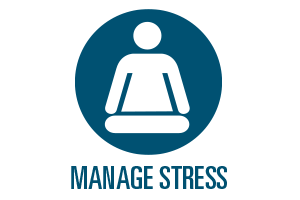People may feel stress in different ways. Knowing what causes you stress and what helps ease your symptoms can help you avoid more serious health issues. Participating in regular relaxation exercises can even help stop stress before it starts.
What are symptoms of stress?
Stress is your body’s natural reaction to a disruption in your daily routine. Small amounts of stress can help you beat fear or give you motivation to finish a task, but larger amounts can hurt your health. It’s important to recognize these symptoms for stress early so you can start managing them right away:
- Upset stomach
- Chest pains
- Headaches
- Muscle tension
- Fatigue or insomnia
- Memory loss
- Irritability
More serious health conditions could also cause some of these symptoms. It is always important to talk about your symptoms with your doctor. If you’re having severe symptoms, like chest pains, seek medical attention right away.
What are some types of stress?
- Acute stress is expected and short-lived. It can be thrilling and exciting, and even gives us energy to get through tough situations like school exams or issues at work.
- Episodic acute stress is caused by a certain situation. It can cause emotional and physical health problems. People with episodic acute stress seem to always be in a rush, take on too much work and have issues with organization.
- Chronic stress is constant and occurs by ignoring or not treating everyday stressors. Chronic stress may cause someone to have a heart attack, stroke or thoughts of suicide if not managed appropriately.
- Post-Traumatic Stress Disorder (PTSD) stems from a past traumatic experience. Someone may experience flashbacks, nightmares or angry outbursts.
If the symptoms of stress are ignored and become severe and constant, it could develop into anxiety. Someone with anxiety may feel extreme worry or fear over everyday life tasks. Anxiety is a form of stress that develops and continues after the stressor is gone.
How to manage stress
The best way to manage stress is to first recognize what causes stress in your life. If you feel that the stress is too much to handle, talk about your symptoms with a doctor. Some simple ways to manage stress are:
- 30 minutes of regular gentle exercise like walking, yoga or tai chi
- Set goals and priorities to decide what is urgent and what can wait
- Relaxation activities like meditation and deep breathing exercises
We can help you take control of stress
Getting rid of all the stress in your life is unlikely, but there are ways to manage it. Blue Cross offers a variety of health programs that can help you understand what’s stressing you out and keep your stress under control by making healthier choices.
Some members can also participate in an online cognitive behavioral health program like Learn to Live.* This program will help you identify the problem, understand how your mind works, and then learn and practice ways to deal with anxiety or stress. Log into your member website to see if it's included in your plan or contact customer service at the phone number on the back of your Blue Cross ID card.
If you’d like help finding a doctor to manage your stress, call customer service or find a doctor online.
More about managing stress
Behavioral and mental health conditions
Anxiety symptoms and treatment
Depression symptoms and treatment

